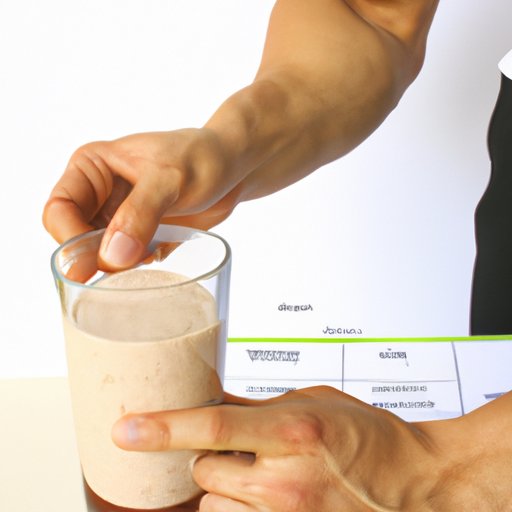Introduction
Protein shakes are a popular dietary supplement that can be used to help build muscle, increase energy levels, and aid in weight management. They come in a variety of flavors and can be consumed as a snack or meal replacement. While there are many potential benefits of drinking protein shakes, it’s important to understand the potential risks and nutritional value in order to make an informed decision about whether or not they are right for you.

Investigating the Benefits of Protein Shakes for a Healthy Diet
Protein shakes can provide a number of benefits for those looking to improve their overall health and fitness. According to a study published in the British Journal of Nutrition, “Consumption of whey protein results in increased energy expenditure, fat oxidation and increased satiety compared with other proteins.” This suggests that consuming protein shakes can help you feel more energized, burn fat more effectively, and stay fuller longer.
In addition to helping with weight management, protein shakes also have the potential to promote muscle growth and strength. A review published in the journal Sports Medicine concluded that “high-quality protein supplements (e.g., whey protein) may be beneficial in promoting gains in muscle mass and strength during resistance training.” This makes them a great option for those looking to bulk up or improve their athletic performance.
Exploring the Pros and Cons of Protein Shakes
When it comes to the pros and cons of drinking protein shakes, there are a few things to consider. On the plus side, they can provide a quick and convenient source of protein, which is essential for building and maintaining muscle. They also tend to be low in calories, making them a good choice for those trying to lose weight. Finally, they can be a great way to get extra nutrients into your diet without having to cook a full meal.
On the downside, some protein shakes contain added sugar, artificial sweeteners, and other potentially unhealthy ingredients. In addition, they may not be as filling as a balanced meal, so you may find yourself getting hungry shortly after drinking one. It’s also important to note that while they can be a great way to get extra protein into your diet, they shouldn’t replace whole foods entirely.

Examining the Nutritional Value of Protein Shakes
When evaluating the nutritional value of a protein shake, it’s important to look at both the macronutrient and micronutrient content. Most protein shakes are made with a combination of protein, carbohydrates, and fat. Depending on the type of protein powder used, the macronutrient content can vary significantly. For example, whey protein is typically higher in protein and lower in carbohydrates than plant-based proteins.
In terms of micronutrients, most protein shakes are fortified with vitamins and minerals such as calcium, magnesium, and vitamin B12. However, it’s important to read the label carefully to make sure the shake you’re drinking is providing all the essential nutrients your body needs. Some protein powders may also contain added fillers or artificial sweeteners, so it’s always a good idea to check the ingredient list before purchasing.
Uncovering the Potential Side Effects of Drinking Protein Shakes
Although protein shakes can be a great addition to a healthy diet, it’s important to be aware of the potential side effects of drinking too much. Consuming large amounts of protein can put stress on the kidneys and lead to dehydration. In addition, drinking too much protein can lead to weight gain, as the excess protein will be converted to fat and stored in the body.
Consuming protein shakes can also cause digestive issues, such as bloating, gas, and constipation. These issues are usually caused by the high amount of lactose found in most protein powders. If you experience any of these symptoms after drinking a protein shake, it’s best to switch to a lactose-free variety or opt for a plant-based protein powder instead.

Comparing Different Types of Protein Shakes to Find the Best One for You
When it comes to choosing the best protein shake for your needs, there are several factors to consider. The most common types of protein powder are whey, casein, and plant-based. Whey protein is quickly absorbed by the body and is a great choice for those looking to build muscle. Casein protein is slower to digest, making it a better option for those who want to stay fuller for longer. Plant-based protein is a great option for vegans or those with allergies or sensitivities to dairy.
In addition to the three main types of protein powder, there are also several other options available. Egg white protein, pea protein, hemp protein, and brown rice protein are all great alternatives to whey and casein. Each has its own unique benefits and drawbacks, so it’s important to do your research and find the one that works best for you.
Conclusion
Overall, protein shakes can be a great addition to a healthy diet. They can help increase energy levels, promote muscle growth, and aid in weight management. However, it’s important to understand the potential risks and nutritional value of drinking protein shakes in order to make an informed decision about whether or not they are right for you. When selecting a protein shake, it’s important to compare different types to find the one that works best for your needs and fits into your overall diet plan.
(Note: Is this article not meeting your expectations? Do you have knowledge or insights to share? Unlock new opportunities and expand your reach by joining our authors team. Click Registration to join us and share your expertise with our readers.)
